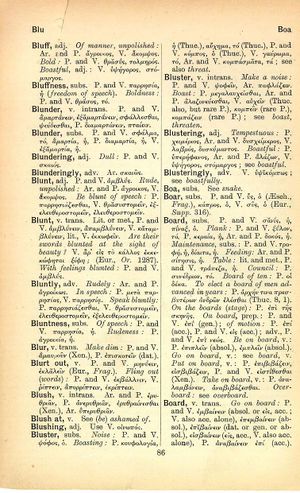blunt
From LSJ
φιλεῖ δέ τοι, δαιμόνιε, τῷ κάμνοντι συσπεύδειν θεός → you know, my good fellow, when a man strives hard, a god tends to lend him aid
English > Greek (Woodhouse)
adj.
P. and V. ἀμβλύς.
Rude, unpolished: Ar. and P. ἄγροικος, V. ἄκομψος.
Be blunt of speech: P. παρρησιάζεσθαι, V. θρασυστομεῖν, ἐξελευθεροστομεῖν, ἐλευθεραστομεῖν.
v. trans.
Lit. or Met., P. and V. ἀμβλύνειν, ἀπαμβλυνειν, V. καταμβλύνειν, lit., V. ἐκκωφεῖν.
Are their swords blunted at the sight of beauty? V. ἆρʼ εἰς τὸ κάλλος ἐκκεκώφηται ξίφη; (Eur., Or. 1287).
With feelings blunted: P. and V. ἀμβλύς.

